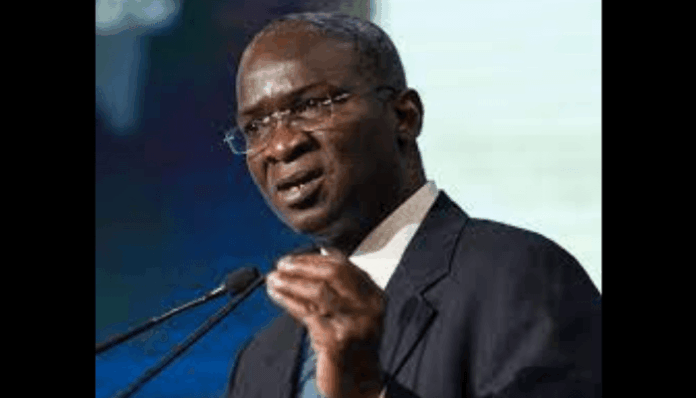

Former Lagos State Governor, Babatunde Raji Fashola, has called for urgent and far-reaching reform of Nigeria’s football sector, describing it as a gateway to untapped economic potential.
He said overhauling the country’s sports industry was a critical lever to spark a nationwide sporting renaissance and address the persistent challenge of youth unemployment.
Fashola, a former Minister of Works and Housing with deep insight into national development strategies, expressed his enthusiasm for receiving sports journalist Mumini Alao’s autobiography, using the occasion to expand the discussion beyond football to the broader spectrum of sports in Nigeria.
Speaking at the public presentation of Alao’s memoir on Sunday, he honoured the veteran journalist’s contributions to the field while setting out a bold vision for sports as a driver of national progress and economic renewal.
He expressed heartfelt appreciation for the platform the event provided, saying, “I am very enthusiastic about being at this event, to receive Mumini Alao’s autobiography and thank him sincerely for the privilege he has afforded me: not only to get a copy of his book in advance, but also to give me this important platform to speak about a subject much after my heart, sports generally and football in particular.
“Sportsmen and women are earning incomes and living lives of luxury that once used to be the preserve of the traditional professions of medicine, law, architecture, engineering, and the likes at the time sports was largely viewed as a hobby.”
Fashola spoke on the critical demographic profile of the sector, noting that sports primarily engage young people from their early teens to around the age of 40, with limited opportunities for older individuals.
This, he argued, places sports at the centre of Nigeria’s youth employment challenge.
“When I reflect on the Nigerian problem of youth employment, I tell myself that it persists perhaps because we have been ignoring the solution,” he said.
He went on to outline the range of employment opportunities generated by the industry beyond the athletes themselves. Using Alao’s career in sports journalism, which spans over three decades, as an example, Fashola underscored the thousands of jobs sustained by sports media.
He cited the multiplicity of dedicated sports channels overseas, pointing to the fifteen SuperSport channels on DSTV alone, which cover disciplines from football and tennis to wrestling and motor racing, employing reporters, cameramen, editors, producers, and technicians.
Fashola drew attention to the scale of professional football’s workforce, noting that Manchester United reportedly had around 1,100 permanent employees before recent cost-cutting, and that a typical 20-team Premier League would sustain about 10,000 full-time jobs, excluding those in lower divisions.
He broadened the picture with economic data, recalling that the English Premier League contributed £3.36 billion to the United Kingdom’s GDP as far back as 2015, supported 100,000 full-time employees, and generated £2.4 billion in tax revenue, with television rights reaching 185 countries and 730 million homes worldwide.
Citing Saudi Arabia’s annual investment of around £5 billion in sports—which has already delivered a one per cent boost to its GDP—Fashola said the figures showed the sector’s power to transform national economies.
On the way forward, he pressed for sports to be firmly embedded in Nigeria’s national development agenda.
He welcomed the recognition of sports as an economic pillar in the 2021–2025 National Development Plan but called for additional measures.
He recommended a nationwide drive to increase public understanding of the vast business and professional opportunities in the industry, along with reforms to educational curricula from primary through tertiary levels to improve talent discovery and development.






